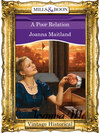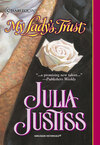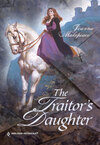Buch lesen: «A Poor Relation»
“I shall happily play for any stakes Miss Winstanley cares to name,” his lordship responded with an innocent smile.
This was now a matter of honor. Isabella rose gracefully. Placing the tips of her fingers on his arm, she could feel the warmth of his body through the layers of his immaculate black evening coat, almost as if she were touching his skin. Yet again, she found she was more aware of this man than any other she had ever met. And from the merest touch!
Lord Amburley lowered his voice to a conspiratorial whisper. “There is no need to go through with this if you have changed your mind, Miss Winstanley. Indeed, I pray you have.”
“Do you, my lord?” She prickled visibly. “But I am not so craven, nor so lost to a sense of honor that I would cry off, I assure you.”
Isabella would let him see that she was a woman to be reckoned with.
A Poor Relation
Joanna Maitland

MILLS & BOON
Before you start reading, why not sign up?
Thank you for downloading this Mills & Boon book. If you want to hear about exclusive discounts, special offers and competitions, sign up to our email newsletter today!
Or simply visit
Mills & Boon emails are completely free to receive and you can unsubscribe at any time via the link in any email we send you.
Contents
Chapter One
Chapter Two
Chapter Three
Chapter Four
Chapter Five
Chapter Six
Chapter Seven
Chapter Eight
Chapter Nine
Chapter Ten
Chapter Eleven
Chapter Twelve
Chapter Thirteen
Chapter Fourteen
Chapter Fifteen
Chapter Sixteen
Chapter Seventeen
Chapter Eighteen
Chapter Nineteen
Chapter One
‘Carriage stopped up ahead, m’lord.’
Lord Amburley did not spare a single sideways glance as he took his curricle past the stationary vehicle at the gallop and raced towards the bend in the wooded road.
‘M’lord—’ The groom made a move to look back.
‘Keep your eyes on the road ahead, Brennan,’ said the Baron sharply.
Brennan gave a grunt of surprise and turned to stare at his master, but Lord Amburley clenched his jaw grimly, ignoring the unspoken question. A moment later, they had rounded the curve and the groom was grabbing wildly for the side of the curricle, as the team was brought from headlong gallop to steaming halt in the space of a few yards.
‘M’lord—’ began the groom, sounding agitated.
‘Keep your voice down. If he realises we’ve stopped, we’ll never take him by surprise.’ Lord Amburley reached under the seat with his free hand as he spoke. ‘What are you waiting for?’ he added in an exasperated whisper. ‘Go to their heads, man. I’ve got my hands full as it is.’ Extracting a pistol from its hiding place, he jumped down and started to make his way cautiously into the trees that now hid the curricle from the carriage.
Just before he disappeared into the thick cover, Lord Amburley threw a final instruction over his shoulder. ‘Get the other pistol, Brennan. That ruffian may well be armed—and he may have accomplices, too. If you hear any shots, bring the curricle back up the road—at the double. And don’t be afraid to shoot if you have to.’ He did not wait for a reply. He knew his groom would obey his orders to the letter, whatever the risk.
It was probably no more than a few hundred yards to the stationary vehicle, but it took Amburley an infuriatingly long time to pick his way through the neglected woodland. The snap of the smallest twig among the dense leaf litter might betray his presence. And he was determined to retain the advantage of surprise. He had seen only one assailant raising his hand to attack the woman by the carriage, but the man was unlikely to be alone. Since the end of the war, the roads were full of bands of starving, desperate men, preying on unwary travellers, especially women. Nothing could excuse such crimes, in Amburley’s view, even though many of the robbers were ex-soldiers, thrown on the scrap-heap by a wickedly ungrateful country.
He crept forward, silently cursing his failure to remove the white driving coat that might so easily betray his presence. He would need to use all the available cover, just as he had learnt to do when he was a soldier in Spain. Pity he had no troop of men at his back, this time.
At last he could see the outline of the carriage through the trees. Taking refuge behind a gnarled oak, he strained his ears. Only one low voice—a woman’s—sounding neither distressed nor anxious. Remarkable, in the circumstances. In Amburley’s experience, gentlewomen usually had a fit of the vapours at the first hint of danger. Perhaps she was only a servant, after all.
However much he tried, he could not quite make out what the woman was saying. Then he heard a second voice—male, deep, a little hesitant.
Amburley risked a quick glance from his hiding place. There was no one else among the trees. The assailant must be alone. Strange—but certainly welcome. It stacked the odds in his own favour.
Levelling his pistol, he walked slowly towards the stationary vehicle.
As he emerged from the trees, the woman started and gave an audible gasp. Everyone else turned, saw, and froze—the coachman on the box, the groom mounted behind, at least one other female cowering in the dark recesses of the carriage—and the woman’s assailant.
Confronted by this petrified tableau, Amburley had time to wonder why neither coachman nor groom had made any move to overpower a single attacker who—he could now see—was neither young nor strong. The two servants appeared to have left the woman—a plain, worn-looking person of indeterminate age, her face hidden by the poke of her faded bonnet—to fend for herself. Odd, unless—
‘Pray, what are you about, sir?’
On hearing her educated voice, Amburley’s first thought was that this woman must be much younger than he had supposed. And fully in command of herself.
‘Would you be so good as to put up that pistol, sir?’ A slight edge of annoyance had crept into the shabby young woman’s voice. This was surely no mere servant.
Keeping his pistol steady, Amburley half turned from the would-be assailant, who was looking increasingly shifty, as though he might take to his heels at any moment.
‘Certainly, madam,’ Amburley said evenly, not taking his eyes off the man. ‘Just as soon as I have an explanation as to why this man was assaulting you.’ He raised his pistol a fraction, so that the man would be in no doubt of his willingness to use it, if he attempted to escape.
The accused man took two steps back, eyes suddenly wide with fear at the sight of the gun’s menacing little black muzzle. He made to speak, but no words came out.
The woman moved smartly between Amburley and his target, turning her back on the pistol and putting her hands reassuringly on the older man’s arms. ‘Don’t worry, Jonah,’ she said gently. ‘I’ll deal with this. Nothing will happen to you, I promise.’
She turned sharply then, shielding Jonah with her body. Fixing her gaze on the pistol, she said, in a voice that had lost all trace of gentleness, ‘By your speech and your dress, sir, you are a gentleman. So I ask you again to put up your pistol. I have not been assaulted. And I have no need of your assistance.’ She glanced up at his face for a second—without meeting his eyes—and then resolutely returned to staring at the pistol. ‘Whatever you thought you had seen, sir, you were mistaken. Thank you for attempting to rescue me—but there really was no need.’
With that, she turned her back once more and began to reassure Jonah, who had not yet fully recovered from his fright.
Amburley stood for a moment before letting his pistol hand drop. By gad, she sounded anything but grateful for his attempted knight-errantry. Indeed, she reminded him of his mother’s companion—sharp and shrewish, as most poor relations became, given half a chance. What a farce he had blundered into. He had been so sure the man Jonah was about to strike her—but it seemed he had been totally wrong. If his old comrades could see Major Amburley now… For a second or two, annoyance warred with amusement. Then he smiled to himself and shook his head resignedly. Heaven help him if this story ever got about. He would never live it down.
The woman had continued to busy herself with the man Jonah. She seemed to be intent on avoiding any further discussion. ‘My apologies, madam,’ Amburley said. ‘Obviously, you do not stand in need of my assistance. I shall not trouble you further.’ Still, she did not face him.
Amburley concluded wryly that he had attempted to rescue a mannerless harpy. Next time he saw a lady under attack, he would do well to drive past, if this was the thanks he could expect. He started back towards the trees but could not resist adding, with exquisite politeness, ‘I wish you a safe onward journey. Good day, madam.’
‘He’s gone, ma’am.’ Jonah’s voice was a half-strangled whisper.
Isabella Winstanley forced herself to straighten her shoulders. There had never been any danger—so why was her stomach still turning like a frightened child’s? And why had she been insufferably rude to a man who was trying to help her? Had she even thanked him? She could not remember. She realised that she had barely looked at him. Would she recognise him if she met him again? He was tall, certainly, and she fancied his hair had been quite dark—but she could not be sure. In the shadow of the trees, the light could play tricks.
‘Miss Isabella.’ Isabella’s abigail, Mitchell, was pushing open the door of the carriage and sounding agitated. ‘Miss Isabella, it’s Miss Sophia…’
Isabella took in the situation at a glance. Sophia Winstanley, her pretty but penniless young cousin, had taken one look at the man with the gun and fainted clean away. How ironic. Only two days earlier, Sophia had been rhapsodising about romantic adventures—handsome strangers lurking in shrubberies, or ghosts and hauntings to send shivers down the spine. Sophia had fancied it would be quite agreeable to meet a ghostly apparition—provided, of course, that it drove her into the arms of an eligible gentleman who just happened to be nearby. Poor Sophia. She would never forgive herself, for this gentleman had certainly been eligible.
Heavens, how can I tell that, Isabella wondered, when I hardly know what he looks like? Was there something—?
At that moment, Sophia stirred, groaning. Her eyelids fluttered, and then snapped wide open. Obviously she was remembering the sight of the gun that had terrified her.
‘He has gone, Sophia. There is nothing to be afraid of now.’ Isabella’s voice was gentle and reassuring once again. She reached into her reticule and offered her vinaigrette. ‘Try this. It will make you feel better.’
Sophia took a cautious sniff. ‘What happened? I don’t understand…’
‘Neither do I,’ said Isabella. ‘I can only surmise that, when the gentleman with the pistol saw Jonah hailing the carriage for me, he somehow assumed that I was being assaulted, and so he rushed gallantly to my rescue—terrifying you, and everyone else, in the process. However, he has gone now. And we, too, must be on our way, or we shall be late arriving at the posting house.’
‘But, Winny—’ began Sophia.
‘I must just say my farewells to Jonah,’ said Isabella matter-of-factly, ignoring the nickname she had repeatedly asked Sophia not to use. The last thing she wanted at present was a dispute about names—or a host of questions about her would-be rescuer.
‘Thank you for your company today, Jonah. I could not have visited such a remote village without your escort—nor achieved half as much with the children without your help. I am only sorry that your kindness should have led to such a scene. It was my fault. I should not have chosen such an isolated spot to meet the carriage, however convenient it might have seemed.’ She pressed some coins into his palm and he smiled, revealing a gap in his front teeth. ‘You’ll take care of those little ones, won’t you?’
‘Don’t you worry, ma’am. No harm will come to ’em, I promise. And a blessing on ye for the help you’ve given to our poor orphans. Ye’re a saint, that’s what ye are, and—’
‘Jonah,’ began Isabella, blushing, ‘I am nothing of the sort, as you know very well.’ She put one worn black boot on the step of the carriage before the groom could climb down to assist her. ‘But thank you, all the same, and God bless you. Goodbye, Jonah.’
Silence reigned in the carriage at last. It had taken Isabella more than half an hour to answer enough of Sophia’s questions to pacify her. In the end, Isabella had forbidden all further discussion of it. The gentleman would certainly wish to forget their absurd encounter had ever happened. He was probably mortified by it.
And so was she.
She settled back in her seat once more, trying to focus her attention on the Yorkshire scenery. It was no use. She could not stop worrying about what had happened. She had always taken such care not to be seen in her ‘poor relation’ guise by anyone from her own station in life—it was the only way of being sure she could keep her philanthropy a secret—and now she had been caught out. Admittedly, the gentleman in question had been a complete stranger, but that could not guarantee her anonymity. If the gentleman came to London for the Season, he was bound to meet her somewhere.
And Isabella would have to be there. Flight was impossible. For she had agreed to chaperon pretty, portionless Sophia for this one London Season so that the child might have a chance of making a good match. Such a promise could not be broken. If they encountered the unknown in London, Isabella would just have to brazen it out, relying on the fact that her usual elegant appearance was a world away from the part she was playing today.
Sophia interrupted Isabella’s painful reverie. ‘How long will it take us to reach London, Winny dear? I am so looking forward to being at Hill Street again, especially as, this time, I shall be out. How many balls do you think we shall attend? Shall I have many partners, do you think? What about—?’
Isabella found herself smiling at Sophia’s infectious enthusiasm. ‘Sophia, please do stop to draw breath,’ Isabella said. ‘If you keep asking so many questions all at once, people will think that you are not at all interested in what they might say in reply.’
‘You mean I talk too much. That’s what Mama says,’ replied Sophia, without much evidence of remorse. ‘I am much more circumspect with people of consequence, I promise. Oh, and Winny—’
Isabella felt she dare not let that pass again. ‘Sophia dear, must you call me “Winny”? It’s such a very odd name for a lady.’
‘But you said that your brother uses it quite often,’ Sophia protested. ‘You do not really mind, do you?’
‘I concede you are merely copying from my quite incorrigible brother—so, yes, I give you leave to continue. But pray,’ she added with a laugh, ‘not in company. I should not like to be widely known as “Miss Winny Winstanley”.’
‘I shall try to remember,’ said Sophia in a small voice, looking down at her clasped hands. After only a moment’s silence, she began again, on the subject that Isabella had been hoping to avoid. ‘Who do you think he was? The man with the pistol, I mean. Do you think that he—’
‘That encounter is not to be discussed,’ said Isabella flatly. ‘Not with anyone. Do you understand, Sophia?’ She waited for the girl’s nod of agreement before continuing, ‘You must see that it could be disastrous for my reputation—and yours—if it were known that I went about the countryside alone, visiting destitute soldiers and orphans.’
‘But you are helping them,’ protested Sophia hotly. ‘How can that destroy your reputation?’
‘My motives would be of no account, I’m afraid. Ladies of the ton do not consort with the lower classes—not for any reason. You will learn that they never go anywhere without a servant in attendance, either. And they certainly do not dress like servants.’ She glanced down at her drab brown dress and fraying shawl. ‘If I were discovered, I would never be admitted to Society again. You must never betray, by so much as a look, that you have seen me like this. Promise me, Sophia!’
‘I promise. At least, I promise to try,’ said Sophia.
Isabella felt the tension relax in her shoulders. ‘I shall be satisfied with that. And now, let us talk of something else.’
‘Yes, let’s,’ said Sophia more eagerly. ‘Tell me about your first Season—er—Isabella. Did you have many offers?’
Isabella smiled resignedly. ‘I only ever had one Season, I’m afraid, and no offers, so there is little to tell.’
‘But why?’
Isabella shrugged. Although she had avoided telling the story until now—over the years, she had learnt to be content with her single state, but it still hurt too much to discuss the deaths of her parents—she knew that Sophia would pester her until she gave in. ‘My Season was cut short because my papa became ill and had to return home,’ she said quietly.
‘But surely there was no need to pack you all off back to the country?’
‘I was only too happy to go, Sophia, I assure you. Mama needed my help to nurse Papa.’
‘Oh.’ Sophia seemed to have realised, at last, where the story was leading. She sat for a moment, thinking. ‘Could you not have had another Season? Later, I mean, when…’ Her voice trailed off.
‘It suited me to remain on the family estate with my brother, Sophia. He could not run it alone.’
‘But surely he runs it alone now,’ protested Sophia.
‘He is a grown man now—and married. He does not need an older sister looking over his shoulder.’
‘Is that why you went to live with Lady Wycham?’
‘Partly.’ Goodness, the child was certainly persistent. Isabella knew she was going to have to embroider the truth from now on. To the outside world, it was Lady Wycham who had the money and Isabella who was the poor relation. It was a fiction both worked hard to maintain.
‘I don’t understand,’ said Sophia.
Isabella sighed. ‘Great-aunt Jemima invited me to join her in Hill Street last year. She would have been alone, otherwise, so it suited us both. I can enjoy as much as I wish of London Society—and she has company about the place. Even more, now that you are joining us,’ she added, with a gentle laugh.
‘And I shall be as good as gold, I promise,’ said Sophia. ‘It is so very generous of Lady Wycham to frank my come-out—’ Isabella hoped she was not blushing ‘—and I intend to make her proud of me. Wait and see!’
‘I’m sure you will. Aunt Jemima is looking forward to taking you to our French modiste for your new gowns. Your dark colouring is all the crack these days, you know. Fair hair is sadly passé, I’m afraid,’ she added with a mischievous glance across at the abigail who spent so many hours arranging Isabella’s honey-gold curls. ‘Should I cover it with a turban, do you think?’
A moment later, they were engulfed in laughter.
In the late afternoon, the carriage arrived at the Bell in Barnby Moor where they were to spend the night. Isabella alighted first to see that all was in order for her party, leaving Sophia, chaperoned by Mitchell, to make a more leisurely descent. Sophia was just remarking on the unusual degree of bustle in the inn-yard, when Isabella returned, grim-faced.
‘It is too vexing,’ she declared. ‘The rooms that were bespoke for us are not available, it seems. The inn is full of gentlemen, here for some sporting event about which I did not enquire. The landlord appears to have preferred the immediate custom of these gentlemen to the prior written instructions of a lady. You will please return to the carriage, Sophia, while I try to resolve matters.’
With firm tread, Isabella returned to the inn to do battle with the landlord for the promised rooms. By the time he eventually appeared, looking hot and flustered, she had been kept waiting for more than ten minutes and her patience had worn extremely thin. Her eyes had lost their usual grey-green calm to become very stormy indeed; her foot was tapping in a rhythm of irritation; and, with her threadbare clothes enhancing the effect, she knew she must appear a veritable harridan. She fully intended to make the most of it in this encounter.
The landlord, however, seemed to be in no mood to acknowledge the justice of her claim. He stated flatly that no rooms were to be had, either in his inn or for several miles around and, furthermore, that the locality was no place for ladies at present, with so large a gathering of sporting gentlemen in residence.
Isabella would have none of it.
Their heated discussion was beginning to attract the attention of the gentlemen assembled in the coffee-room behind her. Isabella could not help but notice that the level of their conversation had become muted as they listened avidly to hers but, driven by the justice of her cause, she would not be deterred. ‘Two chambers and a private parlour were bespoke for Miss Winstanley, besides accommodation for the servants. I insist they be provided immediately. If you have been so lax in your duty as to let them to some of these gentlemen, you must simply require them to move elsewhere. I shall wait here until you have made the arrangements.’
By this time, the coffee-room was almost silent. Isabella coloured a little but stood her ground, wondering whether the men now staring at her defenceless back would have been so reluctant to come to her aid if she had appeared in her normal elegant guise.
The landlord was in a quandary. ‘I’ll ask among the gen’lemen, if you wishes, ma’am, but I don’t see as ’ow I can do what you says. T’wouldn’t be right.’
‘Nor is it right to fail to undertake your commitment to two ladies,’ flashed Isabella.
The landlord shrank a little before her fiery look. His hesitant response was forestalled by the arrival of a young gentleman from the inn-yard who immediately said, ‘Landlord, you have wronged these ladies. I insist that you look to their needs—immediately!’
Isabella’s stormy gaze softened a little at the sight of the young man. His intentions were good, certainly, though they were of little practical help. And the landlord was looking thoroughly mutinous.
The landlord’s response was interrupted by movement from the coffee-room—one of the gentlemen there strode out to join the little group in the hallway.
Isabella swallowed a gasp at the sight of that tall dark figure. She recognised it at a glance. Somehow—impossibly—his powerful outline had become deeply etched in her mind.
It was her would-be rescuer—again!


















